Introduction
The scientific research entitled “Reaching Informed Decisions: Corporate Governance, Knowledge Asymmetry and Intellectual Capital Influences in the International and Romanian Business Environment, before and after the Financial Crisis” is targeted on the analysis of the international environment for business, in the context of the main circumstances that lead the world’s economy to the financial crisis (C. R. G. Popescu & M. Dumitrescu, 2019). In addition, this scientific work emphasizes the roles played by corporate governance, knowledge asymmetry and intellectual capital in the case of the Romanian business environment. What is more, the present research starts with some findings concerning the interventions at the microeconomic and macroeconomic level, and draws attention to the questionable quality of the decisions taken (C. R. G. Popescu & M. Dumitrescu, 2019).
First of all, it should be mentioned that what impressed the authors is that the term “management” is not used at the decision-makers’ level, because the content of this broad concept that is used in organizations and institutions in developed countries is not well known (C. R. G. Popescu & M. Dumitrescu, 2019). Basically, one of the definitions of this concept states that management is the science and art of efficiently managing and optimizing the use of all human, material, financial and informational resources, in order to achieve success (C. R. G. Popescu & M. Dumitrescu, 2019). A special emphasis is placed on the purpose of the process, which must necessarily be quantifiable (C. R. G. Popescu & M. Dumitrescu, 2019). Furthermore, formulations of the following types – “to improve”, “to modernize”, “to increase production” and others of the qualitative type, are not able to determine the materialization of the decision-making process. Nonetheless, there is also the observation that in some qualitative formulations, there is the possibility to decipher quantitative components (C. R. G. Popescu & M. Dumitrescu, 2019). Thus, the proposal to improve the environment (made with the aid of qualitative formulations), should have highlighted quantitative components of the type of the gas emissions and their value, the financial implications for the control and control of these noxious, and other such determining factors (C. R. G. Popescu & M. Dumitrescu, 2019).
Second of all, it should be mentioned that in relation to the content of the decision-making process, the following observations can be made regarding the stages of this process (C. R. G. Popescu & M. Dumitrescu, 2019):
- The first stage is about setting the goal. Numerous examples show that the goal is insufficiently fixed and especially quantified.
- Concerning the collection, selection and ordering of data, there are numerous shortcomings regarding the use or establishment of computer-managed databases that allow us to extensively research the phenomena studied, for which decisions are prepared.
- The analysis of the information, this time representing the significant content of the data, must use different methods to objectify the choices we make.
- Building variants for the decision to be taken is a process that also uses modern methods of interpreting different solutions to keep us from making insufficiently substantiated decisions.
- The actual decision making – the final process that explains the fundamental content of the management process, should not often be taken using only a few criteria. For example, a decision of promotion to a managerial position should not be made solely on the basis of certain decisions. It is often presented as one of the criteria for the level of training, which can be said to have, as a rule, no component of managerial training. This is most evident when appointing a managerial position for which only one criterion often prevails, and this cannot be accepted. There are many examples here, such as appointing some people to a leadership position, for example, on political criteria. Accepting this criterion, it must also be accompanied by a number of other criteria with a quantitative dimension, first and foremost, and of course human quality in completing them.
The structure of this scientific study entitled “Reaching Informed Decisions: Corporate Governance, Knowledge Asymmetry and Intellectual Capital Influences in the International and Romanian Business Environment, before and after the Financial Crisis” is as follows (C. R. G. Popescu & M. Dumitrescu, 2019):
- Firstly, the general details concerning the international environment for business are presented, with a focus on the perspectives before and after the financial crisis, emphasizing the importance of several key economic and business concepts such as economic growth, financial instruments, financial system, economic and financial decline, financial crisis, bankruptcy, moral hazard, knowledge asymmetry, “hidden information”, as well as “free-rider” problem.
- Secondly, the roles played by corporate governance, knowledge asymmetry and intellectual capital in the international environment for business are presented, in order to determine the general international business framework that leads to an economic and financial decline, a financial crisis, and bankruptcy.
- Thirdly, the specificities of the Romanian business environment are taken into consideration, since Romania was severely affected by the 2007-2008 economic and financial crisis, in the attempt to present the role that corporate governance, knowledge and intellectual capital should play in the future in order to avoid such critical situations as the ones already experienced in the past, focusing on the opportunities brought by both tangible and intangible assets to our economy, as well as to their benefits and influences concerning the accounting value, the investments’ decisions, the targeted effectiveness, efficiency and performance, while addressing the challenges of the new economy and the knowledge-based society.
Literature Review
A large and growing body of literature has investigated the manner in which individuals holding leading positions reached informed decisions, focusing in particular on corporate governance, knowledge asymmetry and intellectual capital, taking into consideration the complex influences derived from the factors specific to the international business environment, before and after the financial crisis, which prompted to the need of finding solutions capable of addressing today’s environmental requirements, namely (C. R. G. Popescu & M. Dumitrescu, 2019) (see Figure 1: “Ways of acting responsibly and sustainably in a continuously challenged environment: green innovation, performance, preference and prices”):
(a) A deeper concern for a healthier and more sustainable environment (C. R. G. Popescu, 2016b);
(b) More coherent actions and measures taken to improve the environmental balance, while having in mind biodiversity and care for our future generations (M. Dumitrescu, 2002);
(c) Relentless activities in discovering and implementing solutions capable of supporting green innovation, green preferences and green performance for individuals and entities (J. E. Stiglitz et al. 2009; World Bank Group, 2016);
(d) Tireless operations in positioning entities on the side of responsible and sustainable economic growth and development (D. Smick, 2009).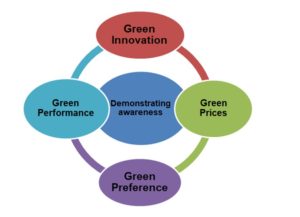
Figure 1: “Ways of acting responsibly and sustainably in a continuously challenged environment: green innovation, performance, preference and prices”
Source: The Authors
Previous research has indicated that various economic indicators as well as numerous economic factors have a positive impact on the process of reaching informed decisions (see Table 1: “Reaching Informed Decisions: Corporate Governance, Knowledge Asymmetry and Intellectual Capital Influences in the International Business Environment, before and after the Financial Crisis”).
Table 1: “Reaching Informed Decisions: Corporate Governance, Knowledge Asymmetry and Intellectual Capital Influences in the International Business Environment, before and after the Financial Crisis”
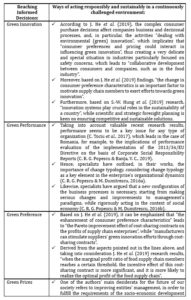
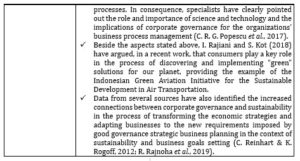
Source: The Authors, based on the scientific works quoted
The decision-making component is always necessary to fit into a strategic dimension that will keep us away from disturbing phenomena which individuals cannot control. Also, there is the profound need to take the inclusion of the new managerial paradigms into consideration in the complex context of the decision-making processes, as follows (see Figure 2: “New managerial paradigms in the complex context of the decision-making processes”) (M. Dumitrescu, 2002; C. R. G. Popescu & M. Dumitrescu, 2016a; C. R. G. Popescu & M. Dumitrescu, 2016b; C. R. G. Popescu, M. Dumitrescu, G. N. Popescu & V. A. Popescu, 2017; C. R. G. Popescu & M. Dumitrescu, 2019):
- Paradigm no. 1 “The Objective Paradigm”: this paradigm takes into account the idea of the continuous development of the capabilities to achieve the desired results, while encouraging new and prolific ways of thinking, in the context governed by free collective aspiration and teamwork, since stimulating the learning capacity represents the key aspect of all the organizations that tend to succeed on the marketplace;
- Paradigm no. 2 “The Knowledge Paradigm”: this paradigm underlines the basic attributes of an organization that is creative and, in the same time, is willing to improve on a regular basis, namely, systemic thinking, personal mastery, mental models, shared vision, and team learning;
- Paradigm no. 3 “The Human Resources Paradigm”: this paradigm specifically focuses on the creativity of contemporary human resource management, starting from the premises that availability of risk taking and ability to accept failure represent the successful traits of creativity as an attribute specific to individuals;
- Paradigm no. 4 “The Intellectual Capital Paradigm”: this paradigm specifically relates to the attributes belonging to individuals’ creative minds, namely, objectivity, mental mobility, willpower and strong motivation, as well as correctly identifying the problems and the proper instruments to solve those problems;
- Paradigm no. 5 “The Environmental Paradigm”: this paradigm places a particular emphasis on the relationship between people and the environment, starting from the point of view that even though the human resources are an important part of any organization and the continuity of companies depends mainly on people, the vital source of
existence is provided by the environment; under these circumstances, the biggest contribution to increasing the efficiency and effectiveness of the organization is made by the relationships that exist, on the one hand, between the people and the environment, and on the other hand, between the companies and the environment;
- Paradigm no. 6 “The Decision-making Paradigm”: this paradigm takes into consideration that the only resources in a company capable of producing and reproducing all the other resources within an organization are the human resources, which points out that individuals are the ones who make decisions with regard to the future actions that need to be taken in a company. The recruitment process within a company takes into account the process of occupying the position, starting from the human resources department which must know the recruitment needs closely and examine the sources that can be used in the process, in case the direct manager of the vacancy and the process manager jointly approve the candidate’s profile in relation to the job responsibilities and the specifications of the recruitment process. Moreover, the final decision concerning the candidates that are going to be selected belongs to the direct manager, following the final interview and the consultation of the evaluation sheet of the interview of the candidates and their evaluation in the assessment center. Furthermore, in case the direct manager identifies an appropriate future employee, this has to be validated together with the department director and the human resources manager. Thus, the personnel recruitment and selection process has to be carefully carried out, since these processes are one of the most important components of the structure of the economic agents activity;
- Paradigm no. 7 “The Support Paradigm”: this paradigm stresses the companies’ values and the manner in which these values are able to support the future of the organizations and enhance their success on the marketplace, namely, responsibility in maintaining high quality standards, performance in maintaining growth and development, quality by evaluating performances that are comparable to international standards, creative ideas are significant when it comes to maintaining ethical and social standards in collaboration with business environment, civil society and authorities;
- Paradigm no. 8 “The Equilibrium/Balance Paradigm”: this paradigm shows, to a large extent, whether or not the employees perceive a company as a creative one that supports and implements their ideas in order to increase the efficiency and productivity of its daily activities – since, the discussion here is about learning organizations, in the light of the emphasis placed on the adaptability to the changes of the contemporary society and the dynamism of the market ( R. G. Popescu & M. Dumitrescu, 2019).
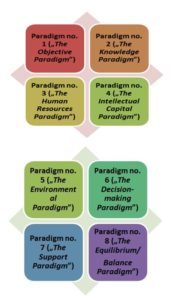
Figure 2: “New managerial paradigms in the complex context of the decision-making processes”
Source: This figure is part of the scientific paper entitled “About Decisions: International Environment for Business and Perspectives before and after the Financial Crisis – Roles played by Corporate Governance, Knowledge Asymmetry and Intellectual Capital in the Romanian Business Environment”, authors: Cristina Raluca Gh. Popescu & Mihail Dumitrescu, presented at the 34th International Business Information Management Association (IBIMA) Conference, 13-14 November 2019, Madrid, Spain, and published in the Proceedings Volume, ISBN: 978-0-9998551-3-3, Editor Khalid S. Soliman. This figure represents the authors’ adaptation after M. Dumitrescu (2002); C. R. G. Popescu & M. Dumitrescu (2016a); C. R. G. Popescu & M. Dumitrescu (2016b); C. R. G. Popescu, M. Dumitrescu, G. N. Popescu & V. A. Popescu (2017).
In addition to the aspects mentioned above, there are numerous speculative instruments in the economy, which set the general tendencies in the international environment for business, and which should be taken into account (C. R. G. Popescu & M. Dumitrescu, 2019) (see Table 2: “Speculative instruments in the economy: general tendencies in the international environment for business”).
Table 2: “Speculative instruments in the economy: general tendencies in the international environment for business”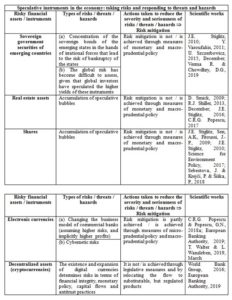
Source: This table is part of the scientific paper entitled “About Decisions: International Environment for Business and Perspectives before and after the Financial Crisis – Roles played by Corporate Governance, Knowledge Asymmetry and Intellectual Capital in the Romanian Business Environment”, authors: Cristina Raluca Gh. Popescu & Mihail Dumitrescu, presented at the 34th International Business Information Management Association (IBIMA) Conference, 13-14 November 2019, Madrid, Spain, and published in the Proceedings Volume, ISBN: 978-0-9998551-3-3, Editor Khalid S. Soliman. This table embodies the authors’ vision, based on the scientific works quoted.
Corporate Governance, Knowledge Asymmetry and Intellectual Capital Influences in the International Business Environment, before and after the Financial Crisis
The section suggestively entitled “Corporate Governance, Knowledge Asymmetry and Intellectual Capital Influences in the International Business Environment, before and after the Financial Crisis” outlines the international environment for business as well as the perspectives before and after the financial crisis, taking into considerations the direct implications of economic growth, economic and financial decline and moral hazard (C. R. G. Popescu & M. Dumitrescu, 2019) (see Table 3: “General tendencies in the international environment for business: the best way to avoid high risks and global imbalances, and how to create a general financial and economic balance”).
Table 3: “General tendencies in the international environment for business: the best way to avoid high risks and global imbalances, and how to create a general financial and economic balance”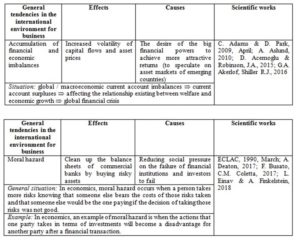
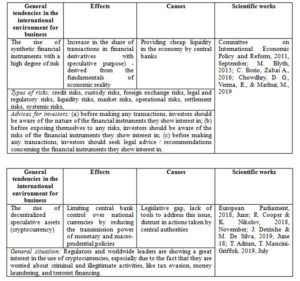
Source: This table is part of the scientific paper entitled “About Decisions: International Environment for Business and Perspectives before and after the Financial Crisis – Roles played by Corporate Governance, Knowledge Asymmetry and Intellectual Capital in the Romanian Business Environment”, authors: Cristina Raluca Gh. Popescu & Mihail Dumitrescu, presented at the 34th International Business Information Management Association (IBIMA) Conference, 13-14 November 2019, Madrid, Spain, and published in the Proceedings Volume, ISBN: 978-0-9998551-3-3, Editor Khalid S. Soliman. This table embodies the authors’ vision, based on the scientific works quoted.
Corporate Governance, Knowledge Asymmetry and Intellectual Capital in International Environment for Business: General Outline
The section suggestively entitled “Corporate Governance, Knowledge Asymmetry and Intellectual Capital in International Environment for Business: General Outline” presents the organization in the international environment for business, taking into account the influences from corporate governance, knowledge asymmetry and intellectual capital (C. R. G. Popescu & M. Dumitrescu, 2019) (see Figure 3: “The organization in the International Environment for Business: influences from Corporate Governance, Knowledge Asymmetry and Intellectual Capital”).
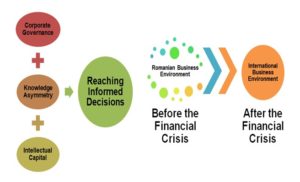
Figure 3: “Corporate Governance, Knowledge Asymmetry and Intellectual Capital Influences in the International and Romanian Business Environment, before and after the Financial Crisis”
Source: The Authors
Due to the need to establish the range of functionality for each area of activity, people felt the desire to group, thus creating numerous organizations established according to the law of the state where the registered offices were established (R. J. Baker, 2007, November; C. Stam & D. Andriessen, 2009; C. R. G. Popescu & M. Dumitrescu, 2019) (see Figure 4: “International and Romanian Business Environment, Challenges before and after the Financial Crisis”).
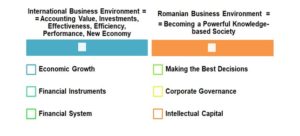
Figure 4: “International and Romanian Business Environment, Challenges before and after the Financial Crisis”
Source: The Authors
The offices where the organizations had their main activity came to be regulated, focusing on protecting the interests of individuals in a more efficient way (C. R. G. Popescu, Popescu, G. N. & Popescu, V. A., 2017a; C. R. G. Popescu, Popescu, G. N. & Popescu, V. A., 2017b; C. R. G. Popescu & M. Dumitrescu, 2019). The organization is presented as a social system through which people interact in order to achieve common goals (P. M. Romer, 1986; N. Roubini & S. Mihm, 2011; C. Tociu, R. Szep, A. M. Anghel, F. Marinescu, M. Ilie, E. Holban, G. Ghita, M. Matei, F. D. Dumitru, I. Popescu, A. Moncea, L. Laslo, A. I. Daescu & C. R. G. Popescu, 2017; C. R. G. Popescu & M. Dumitrescu, 2019) (see Figure 5: “The organization in the International Environment for Business: influences from Corporate Governance, Knowledge Asymmetry and Intellectual Capital”).
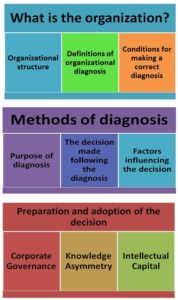
Figure 5: “The organization in the International Environment for Business: influences from Corporate Governance, Knowledge Asymmetry and Intellectual Capital”
Source: This figure is part of the scientific paper entitled “About Decisions: International Environment for Business and Perspectives before and after the Financial Crisis – Roles played by Corporate Governance, Knowledge Asymmetry and Intellectual Capital in the Romanian Business Environment”, authors: Cristina Raluca Gh. Popescu & Mihail Dumitrescu, presented at the 34th International Business Information Management Association (IBIMA) Conference, 13-14 November 2019, Madrid, Spain, and published in the Proceedings Volume, ISBN: 978-0-9998551-3-3, Editor Khalid S. Soliman.
The organization structure of the institutions and the formation of the work compartments are established by the management, respecting the general principles of the organization (M. Berg, 2006; W. A. Bhatti, M. N. Khan, A. Ahmad, N. Hussain & K. Rehman, 2011, April 18; N. Ferguson, 2014; C. R. G. Popescu & M. Dumitrescu, 2019). These units can elaborate structural norms characteristic to the areas in which they carry out their activity, which may be applicable also in the subunits: subsidiaries, branches, operations, factories and norms that do not contravene the legal provisions or the employees (C. Fogarassy, É. Neubauer, H. Mansur, A. Tangl, J. Oláh & J. Popp, 2018; C. Fontan, Carré E. & L’Oeillet G. 2018; M. Friedman & Friedman, R. 2009; C. R. G. Popescu & M. Dumitrescu, 2019) (see Figure 6: “Knowledge Asymmetry: Challenges and Threats of the International Economic and Financial Decline”).
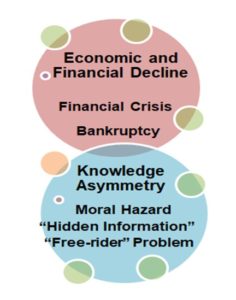
Figure 6: “Knowledge Asymmetry: Challenges and Threats of the International Economic and Financial Decline”
Source: The Authors
The diagnosis is a process of awareness of the elements underlying the correct functioning of an organization, in order to establish the field of activity through a process and other important elements (C. R. G. Popescu, 2018c; Sebestova, J., Rylková, Ž. & Lejková, M. 2018; Sebestova, J., Rylková, Ž., Krejčí, P. & Lejková, M. 2018; C. R. G. Popescu, 2019a; C. R. G. Popescu, 2019b; C. R. G. Popescu, 2019c; C. R. G. Popescu & M. Dumitrescu, 2019). Usually, the organizational diagnosis is made in situations of crisis and organizational decline, the general perception being erroneous starting from the idea that an organization with problems needs a diagnostic process. Also, the diagnosis process targets the entire organization and leads to training recommendations that focus on a certain activity or a certain area of the company or organization, being more detailed, its recommendations have a small effect on the whole company (C. R. G. Popescu, 2019d; C. R. G. Popescu, 2019e; C. R. G. Popescu, 2019f; C. R. G. Popescu & Banța V. C., 2019; C. R. G. Popescu & M. Dumitrescu, 2019). Through the cascade diagnosis, the authors show a form that starts with a general diagnosis that identifies the sensitive points of the organization and continues with a specialized diagnosis or a set of specialized diagnoses, which focus on the elements or the deficient areas, going deep to the level of details agreed upon by the management of the organization and specialists (E. Holban, E. Diacu, M. Matei, G. Ghita, M. Raischi, S. Fronescu, A. Daescu, I. P. Gheorghe, M. Ilie, R. Szep, V. Daescu, D. Dumitru, F. Marinescu, C. Tociu, I. Popescu & C. R. G. Popescu, 2017; IAS 38 Intangible Assets, 2017; D. Ingram, 2019, June 18; C. R. G. Popescu & M. Dumitrescu, 2019).
The initiation that signifies the first meeting between a client and a consultant is the phase in which they try to figure out if they are in an agreement for a possible collaboration (International Monetary Fund, 2019; F. Jaumotte, Lall, S. & Papageorgiou, C. 2013; M. King, 2017; C. R. G. Popescu & M. Dumitrescu, 2019). Contracting is the event in which parties conclude an agreement and claims are mentioned. The phase that determines the state of the organization is the diagnosis that is based on the collection of data and information and their analysis (C. R. G. Popescu & M. Dumitrescu, 2019). Feedback represents the information following the analysis and processing thereof put in the client’s possession for a better and clearer picture of the situation of the organization or company. The planning of the modification has the effect of involving the client in choosing alternative solutions and their critical analysis (C. R. G. Popescu & Popescu, G. N. 2018b; C. R. G. Popescu, 2018a; C. R. G. Popescu, 2018b; C. R. G. Popescu, 2018c; T. Polozova, Musiienko V., Storozhenko O., Peresada O. & Geseleva N., 2019; C. R. G. Popescu & M. Dumitrescu, 2019). The organizational diagnosis helps us perfect what we already do well, correct what we do incorrectly or inefficiently, develop what is incomplete, and temper what is excessive, in order to have an organization that is mature, balanced and fit for evolution (K. Polanyi, 2014; C. R. G. Popescu, Popescu, V. A. & Popescu, G. N. 2014; C. R. G. Popescu, 2016a; C. R. G. Popescu, 2016b; C. R. G. Popescu & M. Dumitrescu, 2019). A simple definition can be stated that the decision is the solution chosen by a system made up of a person, a group or an organization, to solve a problem. Being present in all organizations and in all situations, two problems are encountered in making these decisions (C. R. G. Popescu & M. Dumitrescu, 2019). These problems are related to the necessary information and sharing the same ideas. Leaders cannot claim that they have all the information needed to make decisions because knowledge can be incomplete and insecure (Rajiani, I. & Kot, S. 2018; Rajnoha, R.; Lesnikova, P.; Stefko, R.; Schmidtova, J. & Formanek, I. 2019; C. Reinhart & K. Rogoff, 2012; C. R. G. Popescu & M. Dumitrescu, 2019). The analysis of all variants leads to the correct preparation of the decision (C. R. G. Popescu & M. Dumitrescu, 2019). After scoring these ideas, a first selection is made, in which the ideas or solutions that would involve high costs, or which have other harmful effects on other aspects of the organization are eliminated (C. R. G. Popescu & M. Dumitrescu, 2019). A really good decision is made when the manager can analyze information with no stress or fear related to the consequences of the decision on the business, and when he decides to go further not because of any personal gain, but because the development prospects are good for the whole organization as well as for its employees (H. Kissinger, 2015; N. Klein, 2006; P. Krugman, 1995, April; P. Krugman, 2012; C. R. G. Popescu & M. Dumitrescu, 2019). Thus, while analyzing the organization in the international environment for business and influences from corporate governance, knowledge asymmetry and intellectual capital, J. K. Galbraith (1997) believes turn out to be extremely relevant, namely: our society possesses the power of stating what is good and what is bad. Also, a distinction should be made between what is perfect and what can be, in fact, done, since it is acceptable to exert an effort and make good things for at least a minority of individuals rather than nothing at all (C. R. G. Popescu & M. Dumitrescu, 2019).
Corporate Governance, Knowledge Asymmetry and Intellectual Capital Influences in the Romanian Business Environment, before and after the Financial Crisis: Reshaping the Future
The section suggestively entitled “Corporate Governance, Knowledge Asymmetry and Intellectual Capital Influences in the Romanian Business Environment, before and after the Financial Crisis: Reshaping the Future”, emphasizes the fact that the decision must be viewed in the context of the evolution of 21st century management, in order to prepare the essential components that respond to the characteristics of the future. The future is shaped by the following dimensions (C. R. G. Popescu & M. Dumitrescu, 2019):
- Interdependence, globalism and forward-looking vision: Numerous examples point to an almost exclusive focus on short-term processes, although the example of developed countries should be normally followed, where there is a balance between short- term, medium- term and long-term visions (D. S. Landes, 1998; B. Lev, 2001; A. Lewis, 1954).
- Another feature that must be considered is the social memory that draws attention to the need to conceptualize the past – present – future relationship. At the decision-making level, these statements synthesize and capitalize on the stock of information, knowledge, and the sum of the decisions taken, to give more content to the development processes ( R. G. Popescu & Popescu, G. N., 2019).
- The basis of the decision-making process must relate to the acceleration of the economic processes supported by the research systems that are permanently linked to the modernization of the management process (Y. Liu & A. Tsyvinski, 2018; R. E. Lucas Jr., 1988, July).
- From the evolution of the decision-making process, less attention is given to social issues. It is inconceivable that the decision making process neglects the social-human component, ignoring the improvement of the human condition of development, of life, etc. (S. Pike & G. Roos, 2000; T. Piketty, 2015).
- The decision-making process at the microeconomic and macroeconomic level should not neglect the impact of development, in general, on the state, configuration and content of the environment and how it must be acted upon in a comprehensive manner. By this, the authors mean the actions of the human factor, the technological and financial support, and others, which will lead us to an efficient environmentalism (I. Morris, 2012; Naidoo, V. & Verma, R. 2019).
- At any level of the decision making process, we find ourselves implying knowledge, training and permanent education above all of the management body. Comments on the lack of preparation with its dimensions of novelty and permanence lead to improvisations, unfounded decisions and lack of credibility, which, all together, alter the management process. Learning which is not correlated with the needs of development processes, with the highly evolved level of technological innovations nowadays leads, in many situations, to a superficial approach to decision-making processes (S. Nasar, 2014; Organization for Economic Co-operation and Development (OECD), 2001). A synthesis of the representativeness of the decision-making process is represented by the holistic view on addressing the various problems and situations from comprehensive angles in an evolution that must be researched and known and whose contribution is presented in the information systems and the stock of decisions that are constituted, as have been previously mentioned, in a social memory of great significance at all levels (Organization for Economic Co-operation and Development (OECD), 2016a; Organization for Economic Co-operation and Development (OECD), 2016b).
- So far, the authors have not referred to the processes of materializing the decisions taken at different levels of the organization. They consider that the international practice – the one that started to apply in Romania, advocates for what is called project management. The practice shows that the management of the projects that are carried out in a normative framework represented by different regulations must be understood in such a way that the innovative dimension of this framework will lead to results with well-defined economic and social efficiency. A second point outlines that the project management supervises the entire cycle of a project to avoid unpleasant situations of failure in completing some stages of the project. Also, decisions in project management must take a better account of resource savings, given that they are expensive, and start to lack many types of resources that are absolutely necessary (Organization for Economic Co-operation and Development (OECD), 2018; R. H. Peters & L. A. Taylor, 2017, February; International Federation of Accountants (IFAC), 2018).
Results and Discussions
When analyzing the specific aspects analyzed and debated in the scientific research entitled “Reaching Informed Decisions: Corporate Governance, Knowledge Asymmetry and Intellectual Capital Influences in the International and Romanian Business Environment, before and after the Financial Crisis”, the following key aspects need to be taken into consideration (C. R. G. Popescu & M. Dumitrescu, 2019):
(a) Firstly, the processes of decision-making at the level of the organizations should take into consideration the international environment for business and perspectives before and after the financial crisis, with a particular emphasis on the roles played by corporate governance, knowledge asymmetry and intellectual capital in the Romanian business environment, since the strategies to motivate human resources for performance prove to be crucial at any time;
(b) Secondly, the employees’ reward system is the policy and process by which an organization rewards its employees, related to their duties, contributions and competences in the workplace;
(c) Thirdly, the process of motivating human resources’ performance envisages the fulfillment of the companies’ objectives, and is managed by rewarding competent and motivated employees, stimulating their development, and managing the factors responsible for performance;
(d) Fourthly, the financial reward consists of several elements such as the basic salary, the variable remuneration and the benefits;
(e) Fifthly, in order to ensure a constant and long-term motivation and maximum performance, the non-financial reward system is also needed, through an effective communication with the employer, giving a positive and constructive feedback, recognizing employees’ merits and career opportunities within the company, and designing relaxation programs of the employees working from home/flexible programs of free days, granting the possibility to get involved in new activities depending on the performance, teambuilding and the companies’ development programs.
Conclusions and Limitations
When analyzing the specific aspects reflecting the conclusions and limitations of the scientific research entitled “Reaching Informed Decisions: Corporate Governance, Knowledge Asymmetry and Intellectual Capital Influences in the International and Romanian Business Environment, before and after the Financial Crisis”, the following key aspects need to be taken into consideration (C. R. G. Popescu & M. Dumitrescu, 2019):
(a) Firstly, making decisions at the level of the companies should, at all times, be in accordance with the international environment for business as well as with the roles played by corporate governance, knowledge asymmetry and intellectual capital in the international business environment, in general, and in the Romanian business environment, in particular;
(b) Secondly, it is crucial to identify the extent to which employees – as a determining part of the intellectual capital of organizations, feel influenced by their temporal, cognitive, emotional and sensory-perceptual demands in the workplace;
(c) Thirdly, it is of great importance to stress on the influence of demands arising from the responsibilities in the activity performed, as well as the awareness of the roles and the conflicts;
(d) Fourthly, discovering the degree of job satisfaction and the affective involvement in the activity is crucial for all the organizations worldwide;
(e) Fifthly, underlining the existence of a leadership style oriented towards feedback, information and encouraging team spirit is crucial for all the organizations worldwide;
(f) Sixthly, recognizing the changes in the general health of the employees is crucial for all the organizations worldwide, since the leadership style oriented towards feedback, information and encouraging team spirit is a must in every successful organization, and since the changes in the general health of employees as well as behavioral, somatic and cognitive stress could arise at any time given the influences coming from the leadership of enterprises.
In addition, these days, since humanity is confronting itself with a new challenge (the COVID-19 pandemic), reaching informed decisions should be done while focusing much more on sustainable development goals and on sustainable development knowledge (C. R. G. Popescu, 2020d). In this matter, corporate governance, knowledge asymmetry and intellectual capital influences should be assessed by using sustainability instruments, in order to ensure that both the international business environment and the Romanian business environment respect the recovery protocols of economies and societies after the impact of COVID-19 pandemic (C. R. G. Popescu, 2020d). Thus, the modern economic approach to competitiveness and sustainability, especially in today’s new context governed by the COVID-19 pandemic, should tackle more profound issues, such as: conserving the Planet’s natural resources, ensuring safe urban environments, promoting the benefits and principles of the circular economy, and building smart cities as well as sustainable, durable and robust livelihoods (V. A. Popescu, G. N. Popescu & C. R. G. Popescu, 2015).
Acknowledgements
This research received no specific grant from any funding agency in the public, commercial, or non-profit sectors. Some of the contributions/parts presented in this work were communicated and published in the scientific paper entitled “About Decisions: International Environment for Business and Perspectives before and after the Financial Crisis – Roles played by Corporate Governance, Knowledge Asymmetry and Intellectual Capital in the Romanian Business Environment”, authors: Cristina Raluca Gh. Popescu & Mihail Dumitrescu, at the 34th International Business Information Management Association (IBIMA) Conference, 13-14 November 2019, Madrid, Spain, and published in the Proceedings Volume “Vision 2025: Education Excellence and Management of Innovations through Sustainable Economic Competitive Advantage” (Proceedings of the 34th International Business Information Management Association Conference (IBIMA)), ISBN: 978-0-9998551-3-3, Editor Khalid S. Soliman, pp. 1264-1286, International Business Information Management Association, USA.
(adsbygoogle = window.adsbygoogle || []).push({});
References
- D. Acemoglu & Robinson, J.A. (2015). De ce eşuează naţiunile: Originile puterii, ale prosperităţii şi ale sărăciei, Editura Litera, Bucureşti.
- C. Adams & D. Park (2009, April), Causes and Consequences of Global Imbalances: Perspective from Developing Asia, ADB Economics Working Paper Series No. 157, Asian Development Bank, Mandaluyong City, Philippines, 34 pages, ISSN 1655-5252, Retrieved 12th July 2019, from https://www.adb.org/sites/default/files/publication/28248/economics-wp157.pdf.
- T. Adrian, T. Mancini-Griffoli (2019, July), Fintech Notes: The Rise of Digital Money, International Monetary Fund (IMF), Note/19/01, Cataloging-in-Publication Data, IMF Library, 17 pages, ISBN 978-1-49832-490-8 (paper).
- G.A. Akerlof, Shiller R.J. (2016), La pescuit de fraieri. Economia manipulării si a înşelăciunii (Titlul original: Phishing for Phools), Editura Publica.
- Aslund (2010). Cum s-a construit capitalismul. Transformarea Europei Centrale şi de Est, a Rusiei şi a Asiei Centrale, Editura Tipo Moldova, Iaşi, ISBN: 973-168-409-3.
- R. J. Baker (2007, November), Mind Over Matter: Why Intellectual Capital is the Chief Source of Wealth, Publisher: Wiley, ISBN: 978-0-470-05361-4.
- M. Berg (2006), “The Genesis of ‘Useful Knowledge’,” International Economic History Congress, Helsinki, Session 38.
- W.A. Bhatti, M.N. Khan, A. Ahmad, N. Hussain, K. Rehman (2011, April 18), “Sustaining Competitive Advantage through effective knowledge management,” African Journal of Business Management, 5(8), pp. 3297-3301.
- M. Blyth (2015). Austeritatea. Istoria unei idei periculoase, Editura Tact, Cluj-Napoca.
- Borio, Zabai A. (2016), Unconventional monetary policies: a re-appraisal, BIS Working Papers nr. 570/15.iulie.2016, 49 pages, Bank for International Settlements, Retrieved 12th July 2019, from https://www.bis.org/publ/work570.htm.
- F. Busato, C.M. Coletta (2017), A moral hazard perspective on financial crisis, Banks and Bank Systems, Business Perspectives Organization, Volume 12, Issue 3, Retrieved 12th July 2019, from https://businessperspectives.org/images/pdf/free/9309/BBS_2017_03cont_Busato.pdf
- Chowdhry, D. G., Verma, R., & Mathur, M. (2019). The Evolution of Business in the Cyber – Age: Digital Transformation, Threats, and Security. Apple Academic Press. DOI: 9781771888103.
- Committee on International Economic Policy and Reform (2011, September), Rethinking Central Banking, Report, Retrieved 12th July 2019, from https://www.brookings.edu/wp-content/uploads/2016/06/Rethinking-Central-Banking.pdf.
- R. Cooper & K. Nikolov (2018, November), Government Debt and Banking Fragility: the Spreading of Strategic Uncertainty, International Economic Review, Volume 59, Issue 4, pp. 1905-1925, Wiley Online Library, https://doi.org/10.1111/iere.12323.
- Deaton (2017). Marea evadare: sănătatea, bogăţia şi originile inegalităţii, Editura Litera, Bucureşti.
- J. Detrixhe & M. De Silva (2019, June 18), Behold Libra, the global cryptocurrency masterminded by Facebook, Retrieved 12th July 2019, from https://qz.com/1645838/facebook-unveils-libra-its-new-global-cryptocurrency/.
- M. Dumitrescu (2002), „Strategii și managementul strategic”, Economică Publishing House, Bucharest, Romania.
- ECLAC (1990, March), Changing production patterns with social equity: the prime task of Latin American and Caribbean development in the 1990s, Corporate author: NU. CEPAL, UN symbol: LC/G.1601-P ISBN: 9211211557, 177 p., Retrieved 12th July 2019, from https://www.cepal.org/en/publications/37869-changing-production-patterns-social-equity-prime-task-latin-american-and.
- L. Einav & A. Finkelstein (2018), Moral Hazard in Health Insurance: What we know and how we know it, Journal of the European Economic Association, 16(4), pp. 957–982, DOI: 10.1093/jeea/jvy017, Retrieved 12th July 2019, from https://economics.mit.edu/files/14545
- European Banking Authority (2019), EBA assesses impact of FinTech on payment institutions’ and e-money institutions’ business models, Retrieved 12th July 2019, from https://eba.europa.eu/-/eba-assesses-impact-of-fintech-on-payment-institutions-and-e money-institutions-business-models.
- European Parliament (2018, June), Cryptocurrencies and blockchain: Legal context and implications for financial crime, money laundering and tax evasion, European Parliament’s Special Committee on Financial Crimes, Tax Evasion and Tax Avoidance, Policy Department for Economic, Scientific and Quality of Life Policies, Study Requested by the TAX3 Committee, European Parliament, Brussels, European Union, Retrieved 12th July 2019, from http://www.europarl.europa.eu/cmsdata/150761/TAX3%20Study%20on%20cryptocurrencies%20and%20blockchain.pdf.
- N. Ferguson (2014). Marele declin: Cum decad instituţiile şi mor economiile, Editura Polirom, Bucureşti.
- Fogarassy, É. Neubauer, H. Mansur, A. Tangl, J. Oláh, J. Popp (2018), The main transition management issues and the effects of environmental accounting on financial performance – with focus on cement industry, Published by: Editura ASE, Journal: Revista “Administratie si Management Public” (RAMP), Issue No: 31, Page Range: 52- 66, Page Count: 15.
- Fontan, Carré E., L’Oeillet G. (2018), Theoretical perspectives on the new era of central banking, French Politics, Volume 16, Issue 4, pp. 453–470, Retrieved 12th July 2019, from https://link.springer.com/article/10.1057/s41253-018-0067-8.
- M. Friedman, Friedman, R. (2009). Libertatea de a alege. O declaraţie personală, Editura Publica, Bucureşti.
- J.K. Galbraith (1997), Societatea perfectă: la ordinea zilei: binele omului, Eurosong & Books, 127 pages, Bucharest, Romania, ISBN: 9730003971.
- Holban, E. Diacu, M. Matei, G. Ghita, M. Raischi, S. Fronescu, A. Daescu, I. P. Gheorghe, M. Ilie, R. Szep, V. Daescu, D. Dumitru, F. Marinescu, C. Tociu, I. Popescu, C.R.G. Popescu (2017), “Assessment of atmospheric pollution in a cement factory area situated in the eastern part of Romania,” Journal of Environmental Protection and Ecology, vol. 18, no. 3, pp. 819–830, ISSN 1311-5065.
- IAS 38 Intangible Assets (2017), Retrieved 12th July 2019, from https://www.pkf.com/media/10031776/ias-38-intangible-assets-summary.pdf.
- D. Ingram (2019, June 18), Facebook to launch digital currency, Libra, in effort to create new global payment system: The project is the biggest step of any major corporation into the emerging realms of digital currency and blockchain technology, Retrieved 12th July 2019, from https://www.nbcnews.com/tech/tech-news/facebook-launch-digital-currency-libra-effort-create-new-payment-system-n1018576.
- International Federation of Accountants (IFAC) (2018), Retrieved 12th July 2019, from https://www.ifac.org/.
- International Monetary Fund (2019), World Economic Outlook Reports, World Economic Outlook, April 2019, Growth Slowdown, Precarious Recovery, April 2019, Retrieved 12th July 2019, from https://www.imf.org/en/Publications/WEO/Issues/2019/03/28/world economic-outlook-april-2019.
- Jaumotte, Lall, S. & Papageorgiou, C. (2013), Rising Income Inequality: Technology, or Trade and Financial Globalization? IMF Econ Rev, 61: 271. https://doi.org/10.1057/imfer.2013.7.
- M. King (2017), Sfârşitul alchimiei. Banii, băncile și viitorul economiei mondiale, Editura Comunicare.ro, 464 pages, ISBN: 978-973-711-574-4.
- Kissinger (2015). Ordinea mondială, Editura Rao, Bucureşti.
- N. Klein (2006). Doctrina şocului. Naşterea capitalismului dezastrelor, Editura Vellant, Bucureşti.
- P. Krugman (1995, April), Peddling Prosperity: Economic Sense and Nonsense in an Age of Diminished Expectations, W. W. Norton & Company; 59090th edition (April 17, 1995), 320 pages, ISBN-10: 9780393312928, ISBN-13: 978-0393312928.
- P. Krugman (2012), End This Depression Now!, W. W. Norton & Company; 1 edition (April 30, 2012), 272 pages, ISBN-10: 9780393088779, ISBN-13: 978-0393088779.
- D.S. Landes (1998). The Wealth and Poverty of Nations: Why Some Are so Rich and Some so Poor, W. W. Norton, New York.
- B. Lev (2001), Intangibles Management, Measurement, and Reporting. Brookings Institution Press, Washington DC.
- Lewis (1954). Economic Development with Unlimited Supplies of Labour, The Manchester School.
- Y. Liu & A. Tsyvinski (2018), Risks and Returns of Cryptocurrency, Yale University, Retrieved 12th July 2019, from https://economics.yale.edu/sites/default/files/files/Faculty/Tsyvinski/ cryptoreturns%208- 7-2018.pdf.
- R.E. Lucas Jr. (1988, July), On the mechanics of economic development, Journal of Monetary Economics, Vol. 22, Issue 1, pp. 3-42, https://doi.org/10.1016/0304- 3932(88)90168-7.
- Morris (2012). De ce vestul deţine încă supremaţia şi ce ne spune istoria despre viitor, Editura Polirom, Iaşi.
- Naidoo, V. & Verma, R. (2019). Green Marketing as a Positive Driver toward Business Sustainability. Hershey, PA: IGI Global. DOI: 10.4018/978-1-5225-9558-8.
- S. Nasar (2014). Geniul economic, Editura ALL, Bucureşti.
- Organization for Economic Co-operation and Development (OECD) (2001), The Well Being of Nations. The Role of Human and Social Capital, Centre for Educational Research and Innovation, Retrieved 12th July 2019, from http://www.oecd.org/site/worldforum/33703702.pdf.
- Organization for Economic Co-operation and Development (OECD) (2016a), Better Policies for 2030. An OECD Action Plan on the Sustainable Development Goals, Retrieved 12th July 2019, from https://www.oecd.org/dac/Better%20Policies%20for%202030.pdf.
- Organization for Economic Co-operation and Development (OECD) (2016b), Better Policies For 2030: An OECD Action Plan on the Sustainable Development Goals, Retrieved 12th July 2019, from https://www.oecd.org/dac/OECD-action-plan-on-the sustainable-development-goals-2016.pdf.
- Organization for Economic Co-operation and Development (OECD) (2018), The OECD measurement of social capital project and question databank, Centre for Educational Research and Innovation, Retrieved 12th July 2019, from http://www.oecd.org/sdd/social capital-project-and-question-databank.htm.
- R. H. Peters & L. A. Taylor (2017, February), “Intangible capital and the investment-q relation,” Journal of Financial Economics, Volume 123, Issue 2, pp. 251-272.
- S. Pike & G. Roos (2000), “An introduction to intellectual capital,” Works Institute Journal. 42, pp. 21-27.
- T. Piketty (2015). Capitalul în secolul XXI, Editura Litera, Bucureşti.
- K. Polanyi (2014). Marea transformare: Originile politice şi economice ale epocii noastre, Editura Tact, Cluj-Napoca.
- T. Polozova, Musiienko V., Storozhenko O., Peresada O., Geseleva N. (2019), Modeling of energy-saving processes in the context of energy safety and security, Journal of security and sustainability issues, No.8(3), pp. 387-397.
- C.R.G. Popescu & Banța V.C. (2019), Performance Evaluation of the Implementation of the 2013/34/EU Directive in Romania on the Basis of Corporate Social Responsibility Reports. Sustainability (ISSN 2071-1050; CODEN: SUSTDE) 2019, 11(9), 2531; https://doi.org/10.3390/su11092531; https://www.mdpi.com/2071-1050/11/9/2531.
- C.R.G. Popescu & M. Dumitrescu (2016a), The Importance of Change Typology – a Key Element in the Enterprise’s Organizational Dynamics, Revista “Manager Journal” în nr. 23/2016, pp. 116 – 123, http://manager.faa.ro/en/volumes/Manager-23–2016~105.html.
- C.R.G. Popescu & M. Dumitrescu (2016b), A New Configuration: Management’s Paradigms – Acting in the Context of Social Economy, Revista “Manager Journal” în nr. 23/2016, pp. 124 – 137, http://manager.faa.ro/en/volumes/Manager-23–2016~105.html.
- C.R.G. Popescu & M. Dumitrescu (2019), About Decisions: International Environment for Business and Perspectives before and after the Financial Crisis – Roles played by Corporate Governance, Knowledge Asymmetry and Intellectual Capital in the Romanian Business Environment, 34th International Business Information Management Association (IBIMA) Conference, 13-14 November 2019, Madrid, Spain, published in the Proceedings Volume, ISBN: 978-0-9998551-3-3, Editor Khalid S. Soliman, https://ibima.org/accepted-paper/about-decisions-international-environment-for-business and-perspectives-before-and-after-the-financial-crisis-roles-played-by-corporate governance-knowledge-asymmetry-and-intellectual-capi/.
- C.R.G. Popescu, M. Dumitrescu, G.N. Popescu, V.A. Popescu (2017), Improving management, requirement of the socio – economic development processes. The role and importance of science and technology and the implications of corporate governance for this process, Conferinţa Internaţională ˝Dezvoltare durabilă în condiţii de instabilitate economică˝, Ediţia a VI-a, 23 – 24 iunie 2017, Satu Mare, organizată de Academia Comercială Satu Mare, Facultatea Management Financiar Bancar, Editors: prof. univ. dr. Marin Andreica, conf. univ. dr. Romulus Andreica, conf. univ. dr. Madalina Ecaterina Popescu: The Proceedings of the International Conference: Cybernetics MC Publishing House, Bucharest 2017, ISBN 978-606-8288-02-4, http://conferinta.academia comerciala.ro/CD_2017/cd2017v2.htm.
- C.R.G. Popescu & Popescu, G.N. (2018a), “Risks of cyber attacks on financial audit activity,” Audit Financiar, vol. XVI, no. 1(149)/2018, pp. 140-147, DOI: 10.20869/AUDITF/2018/149/006, Retrieved from http://dx.doi.org/10.20869/AUDITF/2018/149/006.
- C.R.G. Popescu & Popescu, G.N. (2018b), “Methods of Evaluating “Intellectual capital” of an Organization and Ways of Enhancing Performance in the Knowledge-based Economy – A Synthetically Approach” The 32nd IBIMA Conference, 15-16 November 2018, Seville, Spain, www.ibima.org, ISI Conference Proceedings Citation Index; https://ibima.org/conference/32nd-ibima-conference/#ffs-tabbed-15, Proceedings of the 32nd International Business Information Management Association Conference, ISBN: 978-0-9998551-1-9, Vision 2020: From Regional Development Sustainability to Global Economic Growth (Editor – Khalid S. Soliman), International Business Information Management Association (IBIMA), Copyright 2018, pp. 7060-7074.
- C.R.G. Popescu & Popescu, G.N. (2019a), An Exploratory Study Based on a Questionnaire Concerning Green and Sustainable Finance, Corporate Social Responsibility, and Performance: Evidence from the Romanian Business Environment. J. Risk Financial Manag., 12, 162. DOI: https://doi.org/10.3390/jrfm12040162.
- C.R.G. Popescu, & Popescu, G.N. (2019b), The Social, Economic, and Environmental Impact of Ecological Beekeeping in Romania. In G. Popescu (Ed.), Agrifood Economics and Sustainable Development in Contemporary Society (pp. 75-96). Hershey, PA: IGI Global. doi:10.4018/978-1-5225-5739-5.ch004.
- C.R.G. Popescu & Popescu, G.N. (2019c), International Environment for Business: Economic Growth, Sustainable Development, Competitiveness and the Power of Intellectual Capital – Focus on Romanian Business Environment, 34th International Business Information Management Association (IBIMA) Conference, 13-14 November 2019, Madrid, Spain, published in the Proceedings Volume, ISBN: 978-0-9998551-3-3, Editor Khalid S. Soliman, https://ibima.org/accepted-paper/international-environment-for-business-economic-growth-sustainable-development-competitiveness-and-the-power of-intellectual-capital-focus-on-romanian-business-environment/.
- C.R.G. Popescu, Popescu, G.N. & Popescu, V.A. (2017a), “Assessment of the State of Implementation of Excellence Model Common Assessment Framework (CAF) 2013 by the National Institutes of Research – Development – Innovation in Romania, “Amfiteatru Economic, 19(44), pp. 41-60, Retrieved from http://www.amfiteatrueconomic.ro/temp/Articol_2593.pdf.
- C.R.G. Popescu, Popescu, G.N. & Popescu, V. A. (2017b), “Sustainability Leadership, the Key to a Better World – A Case Study on Romania’s Situation, ” The 29th IBIMA Conference, 3 – 4 May 2017, Vienna, Austria, www.ibima.org, http://www.ibima.org/AUSTRIA2017/papers/sust.html, Proceedings of the 29th International Business Information Management Association Conference, 3-4 May 2017, Vienna, Austria, ISBN: 978-0-9860419-7-6, Education Excellence and Innovation Management through Vision 2020: From Regional Development Sustainability to Global Economic Growth (Editor- Khalid S. Soliman), International Business Information Management Association (IBIMA), Copyright 2017, pp. 79-92.
- C.R.G. Popescu, Popescu, V.A. & Popescu, G.N. (2015). “The entrepreneur’s role in the performance growth of the financial audit activity in Romania,” Amfiteatru Economic, 17(38), pp. 232-251, Retrieved from http://www.amfiteatrueconomic.ro/temp/Article_2382.pdf.
- C.R.G. Popescu (2016a), Teaching and learning the discipline “European business environment”: proposal for an interactive approach (în limba engleză), Editura C.H. Beck, Bucureşti, 100 pagini, ISBN 978-606-18-0609-6.
- C.R.G. Popescu (2016b), Contributions Regarding the Study and Evaluation of Interdependencies Between Key Factors in Increasing the Competitiveness (în limba engleză), Editura Mustang, Bucureşti, 2016, 290 pagini, ISBN 978-606-652-102-4.
- C.R.G. Popescu (2017), “The Role of Total Quality Management in Developing the Concept of Social Responsibility to Protect Public Interest in Associations of Liberal Professions,” Amfiteatru Economic, 19 (Special No. 11), pp. 1091-1106, Retrieved from http://www.amfiteatrueconomic.ro/temp/Article_2685.pdf.
- C.R.G. Popescu (2018a), “Intellectual Capital” – Role, Importance, Components and Influences on the Performance of Organizations – A Theoretical Approach, The 32nd IBIMA Conference, 15-16 November 2018, Seville, Spain, www.ibima.org, ISI Conference Proceedings Citation Index; https://ibima.org/conference/32nd-ibima-conference/#ffs-tabbed-15, Proceedings of the 32nd International Business Information Management Association Conference, ISBN: 978-0-9998551-1-9, Vision 2020: From Regional Development Sustainability to Global Economic Growth (Editor – Khalid S. Soliman), International Business Information Management Association (IBIMA), Copyright 2018, pp. 7045-7059.
- C.R.G. Popescu (2018b), „”Intellectual Capital”: Major Role, Key Importance and Decisive Influences on Organizations’ Performance,” Journal of Human Resources Management Research (JHRMR), IBIMA Publishing, (accepted for publication), ISSN: 2166-0018, https://ibimapublishing.com/journals/journal-of-human-resources-management-research/.
- C.R.G. Popescu (2018c), Evaluating intellectual capital and its influence on companies’ performance – a Case Study on Romania’s Experience, The 13th annual International Technology, Education and Development Conference, INTED2019, Valencia (Spain), 11th, 12th and 13th of March, 2019, Title: INTED2019 Proceedings, ISBN: to be assigned, doi: to be assigned, (accepted for publication), https://iated.org/inted/publications.
- C.R.G. Popescu (2019a), “Addressing Intellectual Capital in the Context of Integrated Strategy and Performance: Emphasizing the Role of Companies’ Unique Value Creation Mechanism, While Targeting Better Organizational Reporting In Romania: The Case of Green Marketing and Green Marketing Strategies”, Journal of Marketing Research and Case Studies, Vol. 2019 (2019), Article ID 672821, DOI: 10.5171/2019.672821.
- C.R.G. Popescu (2019b), “”Intellectual Capital”: Major Role, Key Importance and Decisive Influences on Organizations’ Performance”, Journal of Human Resources Management Research, Vol. 2019 (2019), Article ID 509857, DOI: 10.5171/2019.509857.
- C.R.G. Popescu (2019c), Evaluating intellectual capital and its influence on companies’ performance – a Case Study on Romania’s Experience, The 13th annual International Technology, Education and Development Conference, INTED2019, Valencia (Spain), 11th, 12th and 13th of March, 2019, Title: INTED2019 Proceedings, ISBN: 978-84-09- 08619-1, Format: USB Flash drive, doi: 10.21125/inted.2019, International Standard Serial Number (ISSN) assigned to the INTED periodical publications: 2340-1079, pp.1032-1041.
- C.R.G. Popescu (2019d), Intellectual capital evaluation and measuring effectiveness – A Case Study on Romania’s Experience in terms of performance and excellence, The 13th annual International Technology, Education and Development Conference, INTED2019, Valencia (Spain), 11th, 12th and 13th of March, 2019, Title: INTED2019 Proceedings, ISBN: 978-84-09-08619-1, Format: USB Flash drive, doi: 10.21125/inted.2019, International Standard Serial Number (ISSN) assigned to the INTED periodical publications: 2340-1079, pp. 1042-1052.
- C.R.G. Popescu (2019e), Business development opportunities: Demonstrating present and future performance, auditing intellectual capital – a case study on Romanian organizations, The 33nd IBIMA Conference, Granada, Spain, 10-11 April 2019, www.ibima.org, ISI Conference Proceedings Citation Index; https://ibima.org/conference/33rd-ibima-conference/, Proceedings of the 33nd International Business Information Management Association Conference, ISBN: 978-0- 9998551-2-6, Education Excellence and Innovation Management through Vision 2020 (Editor – Khalid S. Soliman), International Business Information Management Association (IBIMA), Copyright 2019, pp. 1521-1539.
- C.R.G. Popescu (2019f), Intellectual capital, integrated strategy and performance: focusing on companies’ unique value creation mechanism and promoting better organizational reporting in Romania – a framework dominated by the impact of green marketing and green marketing strategies, The 33nd IBIMA Conference, Granada, Spain, 10-11 April 2019, www.ibima.org, ISI Conference Proceedings Citation Index; https://ibima.org/conference/33rd-ibima-conference/, Proceedings of the 33nd International Business Information Management Association Conference, ISBN: 978-0- 9998551-2-6, Education Excellence and Innovation Management through Vision 2020 (Editor – Khalid S. Soliman), International Business Information Management Association (IBIMA), Copyright 2019, pp. 1540-1555.
- C.R.G. Popescu (2019g), Corporate Social Responsibility, Corporate Governance and Business Performance: Limits and Challenges Imposed by the Implementation of Directive 2013/34/EU in Romania. Sustainability, 11, 5146. DOI: https://doi.org/10.3390/su11195146.
- C.R.G. Popescu (2020a), Analyzing the Impact of Green Marketing Strategies on the Financial and Non – Financial Performance of Organizations: The Intellectual Capital Factor (231218-043727). In V. Naidoo and Rahul Verma (Eds.), Green Marketing as a Positive Driver Toward Business Sustainability (pp. 186-218). Hershey, PA: IGI Global. ISBN13: 9781522595588, ISBN10: 1522595589, EISBN13: 9781522595601, DOI: 10.4018/978-1-5225-9558-8.ch008.
- C.R.G. Popescu (2020b), Developing a Model for Entrepreneurship Competencies – Innovation, Knowledge Management and Intellectual Capital: Success Competences for Building an Inclusive Entrepreneurship and Organizations’ Performance (140819- 052445). In J. Šebestová (Ed.), Developing Entrepreneurial Competencies for Start-Ups and Small Business. Hershey, PA: IGI Global. ISBN13: 9781799827146, ISBN10: 1799827143, EISBN13: 9781799827160, DOI: 10.4018/978-1-7998-2714-6.
- C.R.G. Popescu (2020c), Approaches to Sustainable and Responsible Entrepreneurship: Creativity, Innovation and Intellectual Capital as Drivers for Organizations’ Performance (070819-045228). In B.R. Hernández-Sánchez, J.C. Sánchez-García and A.C. Moreira (Eds.), Building an Entrepreneurial and Sustainable Society. Hershey, PA: IGI Global. ISBN13: 9781799827047, ISBN10: 1799827046, EISBN13: 9781799827061, DOI: 10.4018/978-1-7998-2704-7.
- C.R.G. Popescu (2020d), Sustainability Assessment: Does the OECD/G20 Inclusive Framework for BEPS (Base Erosion and Profit Shifting Project) Put an End to Disputes Over The Recognition and Measurement of Intellectual Capital? Sustainability 2020, 12, 10004, https://doi.org/10.3390/su122310004.
- V.A. Popescu, Popescu, G.N. & Popescu, C.R.G. (2012), Innovation’s Role in Nowadays Society and the Ways to Generate Competitive Intelligence and Accountability: Case of Romania, IBIMA Publishing, Journal of Innovation & Business Best Practices (JIBBP), http://www.ibimapublishing.com/journals/JIBBP/jibbp.html, Vol. 2012 (2012), Article ID 722585, 11 pages, DOI: 10.5171/2012.722585, https://ibimapublishing.com/articles/JIBBP/2012/722585/.
- V.A. Popescu, Popescu, G.N. & Popescu, C.R.G. (2015), Competitiveness and sustainability – a modern economic approach to the industrial policy. Metalurgija, 54 (2), 426-428. https://hrcak.srce.hr/128979.
- Rajiani, I. & Kot, S. (2018), The Prospective Consumers of the Indonesian Green Aviation Initiative for Sustainable Development in Air Transportation, Sustainability, 10, 1772, ISSN 2071-1050, link: https://www.mdpi.com/2071-1050/10/6/1772.
- Rajnoha, R.; Lesnikova, P.; Stefko, R.; Schmidtova, J.; Formanek, I. (2019), “Transformations in Strategic Business Planning in the Context of Sustainability and Business Goals Setting”, Transformations in Business & Economics, Vol. 18, No 2(47), pp.44-66, ISSN 1648-4460.
- C. Reinhart, K. Rogoff (2012), De data asta e altfel. Opt secole de sminteală financiară, Editura: Publica, 608 pages, ISBN 978-973-1931-90-6.
- P.M. Romer (1986), Increasing Returns and Long-Run Growth, The Journal of Political Economy, Vol. 94, No. 5, pp. 1002-1037.
- N. Roubini & S. Mihm (2011), Crisis Economics: A Crash Course in the Future of Finance, Penguin Books; Updated ed. edition (April 26, 2011), 359 pages, ISBN-10: 014311963X, ISBN-13: 978-0143119630.
- C. Tociu, R. Szep, A. M. Anghel, F. Marinescu, M. Ilie, E. Holban, G. Ghita, M. Matei, F. D. Dumitru, I. Popescu, A. Moncea, L. Laslo, A. I. Daescu, C.R.G. Popescu (2017), “Possibilities For Efficient Use Of Valuable Materials From Aluminium Slag To Remove Specific Pollutants In Wastewater,” Journal of Environmental Protection and Ecology, 18, No 3, 842–852, ISSN 1311-5065.
- Science for Environment Policy (2017), Taking stock: progress in natural capital accounting, In-depth Report 16 produced for the European Commission, DG Environment by the Science Communication Unit, UWE, Bristol. Retrieved 8th December 2018, from http://ec.europa.eu/science-environment-policy.
- Sebestova, J. & Rylková, Ž. & Lejková, M. (2018). Satisfied or Competent: Business Environment Quality and Entrepreneurial Reaction. Conference Paper, December 2018, Conference: 18th International Conference Economic Policy in the European Union Member Countries, Majerova, I. (ed.), Proceedings of 18th International Conference Economic Policy in the European Union Member Countries, ISBN 978-80-7510-289-8, Silesian University.
- Sebestova, J. & Rylková, Ž. & Krejčí, P. & Lejková, M. (2018). Different strategic goals in the same business environment: Competent entrepreneurs or just luck?, New Trends in Management: Regional and Cross-border Perspectives, ISBN 978-0-9954618-4-0, Publisher: London Scientific.
- Sebestova, J. & Krejčí, P. & Šiška, P. (2018). “Be or Not To Be”: A Dilemma of Business Policy Support on a Regional Level. Central European Business Review. 7. 3-13. 10.18267/j.cebr.192.
- R.J. Shiller (2013, December), Speculative Asset Prices, Prize Lecture, Yale University, New Haven, CT, U.S.A., pp. 459-501, Retrieved 12th July 2019, from https://www.nobelprize.org/uploads/2018/06/shiller-lecture.pdf.
- D. Smick (2009), Lumea e rotundă. Pericole ascunse pentru economia globală (Titlul original: The World Is Curved: Hidden Dangers to the Global Economy), 336 pages, Editura: Publica, ISBN: 978-973-1931-23-4.
- C. Stam & D. Andriessen (2009), “Intellectual Capital of the European Union 2008: Measuring the Lisbon Strategy for Growth and Jobs”, Electronic Journal of Knowledge Management, Vol. 7, Issue 4, pp. 489-500, Retrieved 12th July 2019, from http://citeseerx.ist.psu.edu/viewdoc/download?doi=10.1.1.690.3325&rep=rep1&type=pdf, ISSN 1479-4411, Academic Conferences Ltd.
- J.E. Stiglitz, Sen, A.K., Fitoussi, J.-P. (2009). The Measurement of Economic Performance and Social Progress Revisited: Reflections and Overview. Sciences Po publications 2009-33, Sciences Po.
- J.E. Stiglitz (2010), Lessons from the Global Financial Crisis of 2008, Seoul Journal of Economics, Vol. 23, No. 3, Retrieved 12th July 2019, from https://www8.gsb.columbia.edu/faculty/jstiglitz/sites/jstiglitz/files/2010_Lessons_Global _Financial_Crisis_Seoul.pdf
- J.E. Stiglitz (2016), Euro. Cum ameninta moneda comuna viitorul Europei, Editura: Publica, 592 pages, ISBN: 9786067222302.
- U. Szczerbowicz (2015, December), The ECB Unconventional Monetary Policies: Have They Lowered Market Borrowing Costs for Banks and Governments? International Journal of Central Banking, Vol. 11, No. 4, pp. 91-127, Retrieved 12th July 2019, from https://www.ijcb.org/journal/ijcb15q5a3.pdf.
- Verma R. & Chowdhry, D.G. (2019). The Green Era: Influencing Positive Behavior Change Is Possible. VSRD International Journal Of Technical And Non – Technical Research, E – ISSN: 0976 – 7967, P – ISSN: 2319 – 2216.
105. Y. Varoufakis (2011). The Global Minotaur: America, the True Origins of the Financial Crisis and the Future of the World Economy, Zed Books Ltd., London.
106. T. Walter & L. Wansleben (2019, March), How central bankers learned to love financialization: The Fed, the Bank, and the enlisting of unfettered markets in the conduct of monetary policy, Socio-Economic Review, mwz011, https://doi.org/10.1093/ser/mwz011.
107. World Bank Group (2016). Global Monitoring Report 2015/2016: Development Goals in an Era of Demographic Change. Overview booklet. World Bank, Washington, DC, Retrieved 12th July 2019, from http://pubdocs.worldbank.org/en/31141444230135479/GMR-Over-and-Exec-Summary English.pdf.













